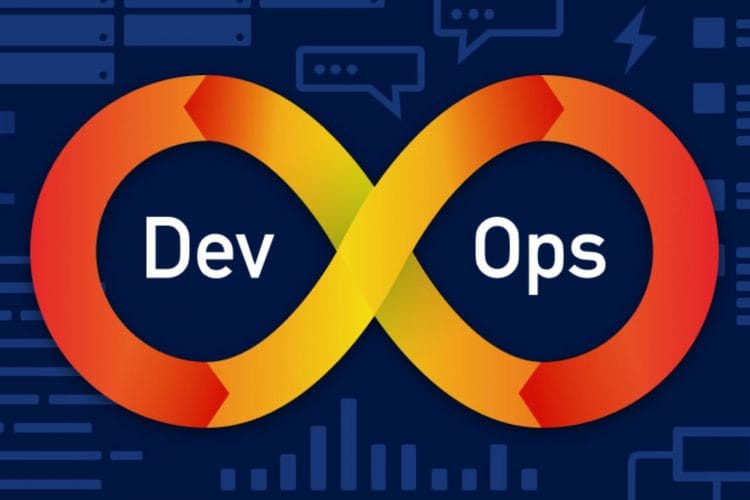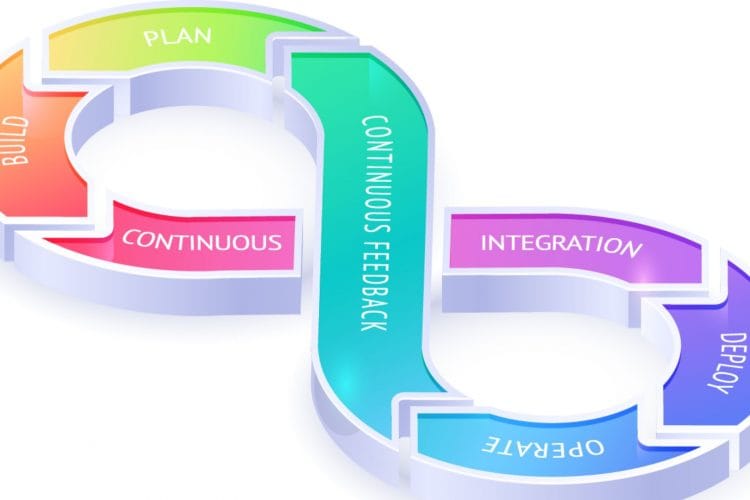
In this fast-changing digital era, companies need to be highly innovative and efficient to compete. Developing and deploying software using those outdated methods doesn’t work anymore. That’s where DevOps solutions enter in.
No matter whether you’re a startup attempting to scale rapidly or a large organization seeking to enhance how you work, employing DevOps can make a significant impact.
Here in this blog, we’ll discuss the advantages of DevOps solutions, tools best suited for startups, the way cloud computing and DevOps are perfectly suited for each other, and the way DevOps transformation services make the journey easier. We will also assist you in determining the proper DevOps solutions and service provider to navigate the journey for you.
What exactly is DevOps?
Nowadays, companies need to release software faster and with greater reliability. DevOps makes this possible by integrating the development and operations teams to act as one group rather than separate departments.
DevOps is not a box full of technologies; however, it is a way of working that encourages collaboration, automation, and continuous improvement. Lean and bottleneck-free operations enable teams to deliver software more quickly, effectively, and with fewer mistakes, thereby delivering better products to end customers.
A real-life example of DevOps transformation services: A fast-growing e-commerce company is experiencing recurrent website deployments and changes. They had a CI/CD pipeline established with Docker and Jenkins under the guidance of a DevOps solutions provider. Deployment time came down from hours to minutes, and site reliability improved due to this automation, enhancing user experience and boosting revenues.
A few trends are shaping the future of cloud computing DevOps on the way to 2025:
- AI and Machine Learning Integration
- Advanced Security Measures (DevSecOps)
- Cloud-Native Practices
- Infrastructure as Code (IaC)
- Enhanced Collaboration Tools
Best DevOps tools for Startups
While DevOps is fundamentally a culture shift, its successful implementation relies on having the right technologies. DevOps solutions are no longer merely a collaborative culture and automation strategy. Additionally, here are the best DevOps tools for startups:
Git (Bitbucket, GitHub, and GitLab)
Due to its significance in version control, collaborative development, and good project management, Git remains fundamental in software development and DevOps. The need for effective and well-managed code handling has never been more critical because of the fast development of technology.
Maven
Maven continues to be a core tool in SD and DevOps solutions due to its continuous application in project dependency management, project building, and project lifecycle management. Being a powerful build automation and project management tool, Maven makes the process simpler by developing Java-based projects by speeding up the compilation, testing, packaging, and distribution process.
The Jenkins
It functions as an effective automation server facilitating pipelines for continuous integration and delivery (CI/CD). Through automated processes like creating, testing, and deploying code changes, Jenkins accelerates software development and provides high-quality, timely product delivery.
Chef
Infrastructure as code for administration largely relies on Chef, a robust automation platform. Chef allows companies to simply achieve speed, reliability, and scalability. Chef makes the workflow more efficient and consistent across the entire infrastructure by allowing server provisioning, configuration, and maintenance to be automated. It reduces human error and ensures that the infrastructure will remain wanted.
A puppet
Since it allows administrators to declare infrastructure as code, Puppet simplifies the management and orchestration of complex IT systems. It ensures configuration consistency and reproducibility across servers, cloud instances, and containers. Heterogeneous, dynamic, and hybrid infrastructures are increasingly critical to organizations.
Ansible
This tool is defined by its simplicity and flexibility. These are the best devops tools for startups for IT operations teams and DevOps solutions due to the fact that it enables companies to automate repetitive tasks, infrastructure deployment, and configuration management in different environments.
Docker
Docker is also a key player in today’s DevOps and software development processes. It may facilitate easier and faster management of apps in multiple situations. Docker containers provide reproducible and predictable deployments from dev to production by containing an app along with its dependencies.
Advantages of DevOps Solutions
By adopting DevOps transformation services, businesses can bring their development cycle one step ahead, improve collaboration, and provide a better experience to customers. Following are the major advantages:
- Increased Automation: DevOps enables organizations to automate most of their manual work, providing time for strategic tasks and reducing the chances of human errors. Techniques such as integration and continuous delivery automate the complete software launch process, including coding and deployment.
- Boost Reliability: DevOps ensures that mechanism changes and application updates are effective to allow you to rapid outcomes without compromising end customers’ satisfaction. To guarantee that all changes are secure and working, apply continuous integration and delivery. You can remain current on performance in real-time by employing monitoring and logging processes.
- Improved Security: Move quickly while still in control and in compliance with regulations. Using configuration management practices, fine-grained controls, and automated compliance standards, you can adopt DevOps solutions and service providers without sacrificing security. For example, you can define and then enforce compliance at scale using infrastructure as code and policy as code.
- Speed: Work fast to enhance your capacity to innovate for customers, adapt to changing market circumstances, and be more efficient at delivering corporate goals. Your operations and development teams can achieve these results with the assistance of the DevOps paradigm. For example, teams can take ownership of services and deploy updates faster due to microservices and continuous delivery.
- Enhance Scalability: DevOps solutions and service providers assist in running and managing your development and infrastructure processes on a larger scale. You can handle complex or dynamic systems better and with less risk if you do them consistently and automatically. Infrastructure as code, for example, allows for more efficient and reproducible management of your dev, test, and production environments.
- Better resource utilization: Develop more effective teams based on a DevOps culture model that focuses on values such as responsibility and ownership. Developers and operations teams collaborate very closely, collaborate on many tasks, and unify their processes. Time is saved, and inefficiency is reduced (e.g., coding for the environment on which it is executed, minimizing handover times between operations and developers).
How to Find the Right DevOps Solutions Provider?
Choosing a relevant DevOps solutions and service provider is highly required for a successful transformation. The major keys to consider while selecting are here:
- Expertise and Experience: In addition to a demonstrated track record, evaluate the level of expertise that a consulting partner can provide. Demand for their certifications, industry awards, and the ability to show the documents on successful implementations via the most up-to-date DevOps methodologies.
- Relevant skills and knowledge: DevOps is continuously evolving, with the latest updates and releases from time to time, well-established tools, and new technologies. Ensure that the DevOps solutions provider has relevant experience with updated tools such as cloud-native CI/CD and blueprint as code.
- Cultural Alignment: DevOps is a cultural transformation as well as a technical one. Apart from straightforward cooperation among development and operations teams, obtain a consulting partner who embodies a DevOps culture within the whole firm.
- Communication and Collaboration: Communication and collaboration tools and platforms are fundamental to the success of a DevOps initiative. Ensure that the consulting partner recognizes the use of latest tool updates for enhancing real-time communication and collaboration.
- Support and Maintenance: Query the provider regarding their use of AI-driven support tools and continuous maintenance to ensure a DevOps environment is secure and dependable.
- Customization and adaptability: Confirm that the solutions provider provides customized solutions tailored to your organization’s particular requirements, leveraging DevOps’s improvement in automation and customization.
Final Thoughts
DevOps change services are not all about the implementation of new processes or tools; it’s about building a culture for innovation, improvement, and teamwork. However, the selection of DevOps tools and partners ultimately depends on what you want to achieve and what you have.
Although choosing the right DevOps solutions provider is a strategic decision, it is a thorough examination of expertise, cultural fit, communication, scalability, and other essential considerations. With the addition of information regarding recent updates and tools, Radiance Solutions professionals are well-equipped to fit in with your organization’s goals and make your innovative DevOps solutions a success.
Wait no longer and click here to contact us!
FAQs
What is a DevOps solution?
DevOps solutions are all about integrating the development and operations teams to act as one group rather than separate departments. DevOps is a way of working that encourages collaboration, automation, and continuous improvement.
Can you name 5 DevOps tools?
The best DevOps tools for startups:
- Git (Bitbucket, GitHub, and GitLab)
- Maven
- The Jenkins
- Chef
- A puppet
- Ansible
- Docker
What are the 7 phases of DevOps?
The 7 phases of DevOps solutions are as follows:
- Continuous development
- Continuous integration
- Continuous testing
- Continuous monitoring
- Continuous feedback
- Continuous deployment
- Continuous operations
What are the four different tools used in DevOps?
Maven, GitHub, Chef, and Jenkins are the four major tools used in DevOps.




